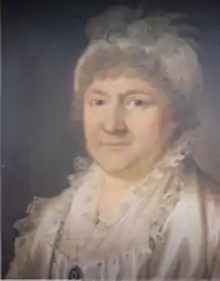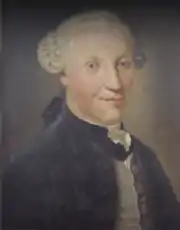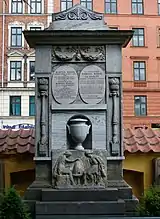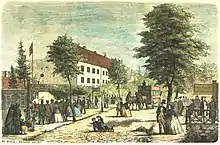Martha Wærn
Martha Wærn née Haslef, also Værn, (22 April 1741 – 27 January 1812) was a wealthy Norwegian-Danish philanthropist who was raised in Christiania, today's Oslo. On her death, in accordance with her will, substantial funding was left for the establishment of a boarding school where fatherless middle-class Norwegian and Danish girls could be trained to become good housewives. Known as Det Wærnske Institut, the school opened in 1814 on Allégade in Copenhagen.[1][2]

Biography

Born on 22 April 1741 in Christiania, Martha Haslef was the younger daughter of the Danish-born merchant Paul Haslef (1706–1781) and Anne Brun (1713–1741). Together with her sister Anna Maria, she was brought up in a well-to-do home in the city. After her mother died when she was an infant, she lived in the family home until she was 30 when she married Morten Wærn, the town clerk, who had been married to her sister until her death in 1771. They had no children.[1]
Following her father's death in 1781, they moved to Copenhagen where her husband died in 1796. Martha Wærn had already inherited from her father and now was left with an even larger fortune.[1] When she died in Copenhagen on 27 January 1812, she left behind a fortune of 200,000 Danish rigsdaler. In addition to the funds she left for the establishment of the Wærn Institute, she also left a considerable amoount to the Norwegian Cadet Corps (Norske Landkadetkorps) and made a donation to Herlufsholm School.[1][2]
Legacy

Martha Wærn is together with her husband buried in Copenhagen's Assistens Cemetery. Their grave monument was designed by Johannes Wiedewelt[3][4]

The Wærn Institute was opened in 1814 as an orphanage and boarding school.[2] Peder Andreas Kolderup Rosenving and Peter Johan Monrad had been selected by Wærn as the two first directors of the institution.[5] Det Wærnske Institut was from 1821 to 1887 based in Møllmanns Landsted at Allégade 6 and then in Luis Bramsen's Villa Tharand on nearby Kastanievej (No. 2). The institution were in 1914 taken over by Mariaforbundet. .[6] It is now operated under the name Kastanievejens Efterskole.
References
- Balslev Wingender, Nete. "Martha Wærn (1741 - 1812)" (in Danish). Kvinfo. Retrieved 23 July 2020.
- Engelstoft, Povl (1984). "Matha Wærn" (in Danish). Gyldendal: Dansk Biografisk Leksikon. Retrieved 23 July 2020.
- "Martha Wærn" (in Danish). Kulturcentret Assistens. Retrieved 26 July 2020.
- "Martha Værn" (in Danish). Kendtes gravsted. Retrieved 26 July 2020.
- H. Hjorth-Nielsen. "P.A. Kolderup Rosenvinge" (in Danish). Dansk Biografisk Leksikon. Retrieved 25 July 2020.
- "Den hele og samlede historie om det Wærnske Institut — kostskolen fra dengang børn jublede bare de fik eet pebermyntebolche" (in Danish). lisahoyrup.dk. 29 December 2013. Retrieved 26 July 2020.
Further reading
- Balslev, Vilhelm: Det Wærnske institut gennem hundrede år (1913)
- Balslev Wingender. Nete: Arven efter Martha Wærn (1992)
External links
| Wikimedia Commons has media related to Martha Wærn. |
